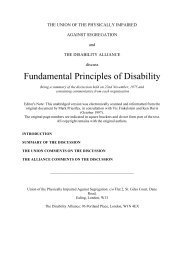Global-Report-Living-Colour-dr2-2
Global-Report-Living-Colour-dr2-2
Global-Report-Living-Colour-dr2-2
Create successful ePaper yourself
Turn your PDF publications into a flip-book with our unique Google optimized e-Paper software.
40<br />
Inclusive Communities = Stronger Communities<br />
GLOBAL REPORT ON ARTICLE 19: THE RIGHT TO LIVE AND BE INCLUDED IN THE COMMUNITY<br />
Responding to Diversity<br />
Inclusion International regions are mainly a response to<br />
global geography. It is a potential strength that each<br />
includes a diverse range of countries. Within countries too<br />
there can be considerable diversity in people’s experience,<br />
e.g. shaped by inequalities in income and the different<br />
patterns of life in urban and rural settlements. Learning<br />
from comparing and contrasting these different<br />
perspectives we can identify some of the most important<br />
structural, cultural, economic and historical factors which<br />
are important in planning action to advance the principles<br />
of Article 19 at different levels of aggregation (local,<br />
national, regional, global). These are elaborated more fully<br />
in what follows, especially Chapter 7, but we summarize<br />
here four important themes for subsequent consideration.<br />
‰ Family structure, culture and personal autonomy<br />
Family is critical to the well-being of people with<br />
intellectual disabilities but family structures vary<br />
hugely, from the single parent or small nuclear family<br />
common in economically rich countries to the large<br />
extended families and indeed membership in local<br />
clans which are still common, for example is some<br />
rural parts of Africa. Alongside these structural<br />
factors there are also differences in family<br />
expectations e.g. whether and when (adult) children<br />
should leave home and the family members’<br />
responsibilities to each other. Another aspect of<br />
culture relates to the basis on which people with<br />
disability experience discrimination, e.g. from<br />
traditional views about disability being a<br />
punishment for wrong-doing or a condition which is<br />
infectious, to the medically-inspired attention to the<br />
person’s “deficits” as the cause of their problems. As<br />
well in many parts of the world the concept that a<br />
person with an intellectual disabilities has rights and<br />
has the legal capacity to exercise those rights is not<br />
understood or accepted. In turn there are widely



